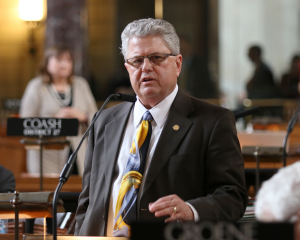Session Review: Retirement Systems

Senators made changes to the state patrol and Omaha school employee retirement systems this session.
LB447, introduced by Omaha Sen. Heath Mello, makes a number of governance and benefit changes to the Class V (Omaha) School Employees Retirement (OSERS) Act, transfers investment authority for OSERS’ assets and changes several benefits in the School Employees Retirement Act.
The bill places OSERS staff under the control of the OSERS board of trustees and allows the board to appoint the OSERS administrator and oversee the administrator and staff. It also transfers investment authority for OSERS funds to the state treasurer, the Nebraska Investment Authority and the state investment officer.
State funding also changes under the bill. If the state appropriates funds for an actuarially required contribution (ARC) in the school employee plan, and the OSERS plan also has an ARC, the Omaha Public School District may request a public hearing before the Appropriations Committee to request additional state funding to pay its ARC.
If the committee recommends payment of the additional funding, and it is approved by the Legislature, the school plan ARC will be computed as a percent of payroll and the state will contribute to OSERS the lesser of the same percent of payroll that was paid to the school plan or the percent of OSERS members’ compensation needed to the meet the OSERS plan ARC.
The bill limits the state service annuity and medical cost of living increase in the Omaha school plan to individuals who were members prior to July 1, 2016.
In addition, school plan members will no longer be able to work up to 20 hours per week while receiving the disability benefit. An employee hired after July 1, 2016, no longer will be able to vest with half year of service credit if he or she is at least 65.
The bill also contains provisions of three additional measures.
LB805, introduced by Mello, requires each political subdivision that has a defined benefit plan to conduct an actuarial experience study at least every four years.
LB922, introduced by Seward Sen. Mark Kolterman, adjusts the terms of the Public Employee Retirement Board (PERB) so that no more than two members will be appointed or reappointed in any one year. It also clarifies procedures for filling a vacated term.
LB986, introduced by the Retirement Systems Committee, adds new duties for the Nebraska Public Employees Retirement Systems executive director, the PERB and the actuary regarding experience studies and annual evaluation reports.
The bill passed on a 46-0 vote.
Lawmakers also approved changes to the retirement plan of new Nebraska State Patrol members.
LB467, sponsored by Kolterman, creates a second tier of reduced benefits for new members. The bill makes the following benefit changes for state patrol officers who are hired on or after July 1, 2016:
• increases the officer contribution rate from 16 to 17 percent;
• reduces the maximum cost of living adjustment (COLA) from 2.5 to 1 percent;
• prohibits participation in the Deferred Retirement Option Plan;
• increases from three to five the number of years of employment used to calculate a member’s final compensation rate;
• limits the increase in compensation in each of the five years prior to retirement to 8 percent per year for benefit calculations; and
• excludes any unused sick, vacation, holiday and compensatory leave converted to cash in the calculation of a member’s final average monthly compensation.
If the plan is 100 percent funded, a maximum one-time supplemental payment of 1.5 percent may be granted at the discretion of the Public Employees Retirement Board.
LB467 passed on a 32-0 vote.
LB1069, introduced by Malcolm Sen. Ken Haar, would have required the state investment officer to review the investment of state funds in both fossil fuels and clean energy and, to the extent that it is prudent, begin the process of divesting from fossil fuels and investing in clean energy.
The committee voted 5-0 to indefinitely postpone the bill.

